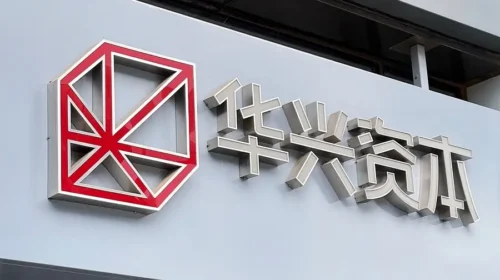Chindata Charts Life After Founder, But Uncertainty Keeps Investors at Bay

The data center operator’s shares rallied after it gave terms for transition with its founder’s departure, only to later give back the gains
Key takeaways:
• Chindata said it has agreed with its founder Ju Jing on terms of his departure, including a substantial reduction of his super-voting shares
• Plan will help the company move forward, though uncertainty remains over new businesses that Ju was promoting
By Warren Yang
Data center operator Chindata Group Holdings (CD.US) is trying to right its ship after the sudden departure of its founder, whose environmentally friendly vision was a major part of the company’s identity. Yet perhaps understandably, investors don’t seem in any rush to get on board as the company’s path forward remains pocked with uncertainties.
Last week, Chindata, controlled by private equity giant Bain Capital, said it had signed an agreement with founder Ju Jing and his related entities on terms of his departure, following his abrupt resignation as CEO last month.
Under the transition, Ju will serve as a non-executive vice chairman and member of the board’s strategy committee for up to 18 months, unless the term is extended. More importantly, Ju will also convert about 13 million Class B shares that he owns through two entities, substantially reducing his aggregate voting power. Each Class B share gives him 15 votes, compared to one for each ordinary Class A share.
A heavy concentration of voting power in the hands of a company’s founder is relatively common in overseas-listed Chinese companies, often through the issue of special classes of shares with super voting rights.
Chindata and Ju worked out their divorce terms about a month after he abruptly stepped down from the top executive position. While the company didn’t explain the surprise move in its initial announcement, which sent its shares plunging, executives subsequently said the board decided to remove Ju because of disagreement on strategies.
The transition agreement could help Chindata move forward more smoothly by reducing the risk of any wrench Ju may try to throw into decision-making processes using his super-voting shares. As of the end of last March, all Class B shares in Chindata were owned by Bain Capital companies and Ju, giving them the power to exercise oversized influence over any key decisions, from the appointment of board members to acquisitions.
Ju held about 41 million Class B shares at the end of last March, giving him about 13% of the company’s voting power. That proportion will drop substantially once he converts 13 million of his super-power shares as agreed. By comparison, Bain Capital companies collectively held 81% of the company’s voting power through its own Class B shares.
Chindata shares rallied a bit after it disclosed the transition agreement, but later gave up all their gains to trade below pre-announcement levels. However, the stock still commanded a forward price-to-earnings (P/E) ratio of 76 at the close of trading last Friday, double the 38.5 for rival VNET Group (VNET.US), indicating investors continue to view it favorably despite the recent turbulence. Analysts don’t expect China’s other major independent data-center operator, GDS Holdings (GDS.US), to turn a profit this year or next.
Chindata also trades higher than VNET on a price-to-book (P/B) and price-to-sales (P/S) ratio, though it trails GDS in both of those measures.
Next-generation pioneer
The spat that led to Ju’s departure occurred after he and other top managers differed on the company’s direction. Ju made a push into component manufacturing and power generation, whereas other board members wanted the company to stay focused on its core business of data center operation, which, perhaps ironically, was Ju’s initial idea.
Ju, who also goes by the first name Alex and sports long, grey hair that gives him an air of hipster cool, founded Chindata’s data center operations in 2015. Bain later acquired the business and merged it with another similar business in 2019, taking the combined group public the next year.
Ju, who was 47 at the end of last March, is an industry veteran with more than 25 years of experience in data center and related equipment industries. In addition to Chindata, he established two other businesses, Shenzhen Qinhuai Shiye Co. Ltd. and Shenzhen Yi’anhua Electromechanical Equipment Co. Ltd.
He’s often labelled a pioneer in designing so-called “next-generation” hyperscale data centers, which are large campus-style facilities capable of faster transmission of data in large quantities at lower latency rates and more affordable costs, compared to older centers.
Ju is also big on green energy, describing himself as a “zero-carbonist” in an interview with Capacity magazine in 2020. That element of his vision has set Chindata apart from its competitors and aligns the company with Beijing’s efforts to cut carbon emissions. Such alignment can be an important advantage in working with government entities, particularly in obtaining approval for new projects.
Even after Ju’s departure, Chindata is likely to continue focusing on next-generation hyperscale data centers powered by renewable energy. This looks prudent, given that the data center industry will keep growing at a healthy clip as more companies go digital and outsource their data management, which will translate into more sales for data center operators like Chindata.
Analysts polled by Yahoo Finance expect the company to post its first annual net profit since its IPO when it releases results for the final quarter of 2021, and they raised their average profit forecast for the company over the past week, probably after release of the new transition announcement.
But Ju’s departure is raising questions about three new businesses established in late 2020. Those include Chinpower and Chinidea, the former aimed at developing renewable energy and the latter at making digital infrastructure equipment. Additional details about these units are slim so far. But on a conference call to discuss final quarterly results for 2020, management hinted they will eventually target external customers, which may have become a source of dissent between Ju and the board.
Chinpower has already signed agreements for wind and solar power projects, and work on a manufacturing facility for Chinidea has started as well. Will those be repurposed now to serve their parent, essentially becoming parts of its internal supply chain? Or perhaps Chindata will put these operations up for sale or try to attract partners? A lot of questions still remain, and lack of a permanent CEO who can answer them only adds to the uncertainty.
Optimism among investors about Chindata’s prospects, as manifested in the valuation of its stock, can perhaps be justified by the company’s leadership in large, green data centers, which likely will drive the industry’s growth. But the selloff in its shares, following the initial rally on news of the transition agreement, indicates that investors want more strategic clarity before deciding whether to sign on with the company under its eventual new permanent CEO.
To subscribe to Bamboo Works free weekly newsletter, click here






